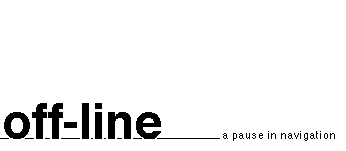 |
 |
(said Aldus Manutius) May , 1999 |
 |
 |
(said Aldus Manutius) May , 1999 |
| Giancarlo Livraghi gian@gandalf.it |
|
| |
|||
|
It's depressing to see so many ruins on the net. Links leading to nowhere (the "linked" has disappeared, or the "linker" isn't checking - or both). Or the stuff is still there, but nobody has updated it in the last three or four years. Crumbling ruins of architectures of which we can vaguely guess the design. When I try to understand why these things happen, I often find that the reason is haste. Someone expected fast results, didn't get them and gave up. "Fast" doesn't mean days or weeks. I know cases in which an objective was set at the end of a year. It wasn't reached and the plan was abandoned. Someone else did the same thing with more consistency, over time went well beyond that objective - and now has the high ground. A website (or any other presence on the net) isn't born grown-up, like Minerva jumping out of Jupiter's head. Nobody (including people who think they are "experts") can really know, at the beginning, how it will (or should) be. We must learn from experience and from our (unavoidable) mistakes, from dialogue with our readers, from testing and adjusting. The real advantage of the net is that we can constantly feel our way and experiment. An interesting thought comes from someone who found himself in similar circumstances five hundred years ago. Johann Gutenberg had invented a new technology, but not a new culture. A Venetian, Aldo Manuzio (or Aldus Manutius, as he is known internationally by his Latin name) faced a new challenge. He didn't only invent a new typeface, that set the pattern for those we are using today. He didn't only define a style of layout that is still a wonderful example. He also developed a new way of choosing and managing content. In one word, he invented publishing. This was his trademark.
It was accompanied by two Latin words: festina lente. "Hurry slowly." It's no coincidence that his "paradox" is a good guideline (I think) for whatever we plan to do on the internet. Electronic communication is fast; but people out there have many other things to do before they come looking for whatever we have to say. I think it's better this way. If we could really reach a large number of people the minute we go online, we would be in trouble. Very probably, we wouldn't be able to cope. The "haste" we need is not fast initial growth. It's speed in reaction and adjustment. We must be alert and fast in answering and learning. We must be flexible, to adjust to ever-changing circumstances; to problems and opportunities that can turn up quite unexpectedly. It's better to make a gradual and "scaleable" investment. To begin with not-too-much visibility, so we can learn from our mistakes while the risks are manageable. To be prepared for gradual development over time. To add resources, and train people, while we learn and grow. It's better, I believe, to check the foundations before we wave a flag on the roof - or we gather a crowd on the top floor. Whatever we do on the net isn't made of brick and stone; we can change it at any time. But it needs a precise and complex architecture, that won't work unless it's well designed and based on solid ground. Festina lente should be written on the wall, I believe, wherever people work on internet projects. Following Aldo's advice may not make us famous for the next 500 years, but it would save us a lot of mistakes and disappointments.
|
|||